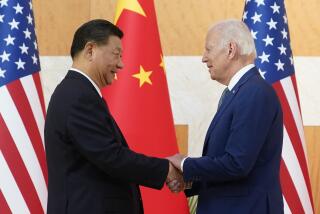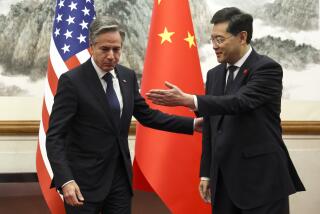The Missing Guest
- Share via
The extraordinary lengths gone to by Chinese officials to prevent noted dissident Fang Lizhi from attending President Bush’s dinner in Beijing over the weekend is a sign of how extremely sensitive the leadership has become to calls for greater political liberalization and freer speech in China. And the passive if not craven complaisance shown by high U.S. officials in the face of this affront to the President says much about the caution that the United States has chosen to exercise when dealing with human-rights abuses in China.
Fang, an astrophysicist who was booted out of the Communist Party two years ago for demanding more democracy, was one of several dissidents invited by the United States to attend the dinner along with hundreds of officials. Chinese authorities allowed at least two of these government critics into the hotel banquet hall. Fang, however, was waylaid by police and delayed for hours until the dinner had ended. Afterward, American officials professed to be “unaware” that he hadn’t been at the banquet. That is an incredible statement.
Consider. China’s most prominent dissident is invited to be a dinner guest of the President of the United States. It is no secret that this action displeases the Beijing regime, nor could it have gone unsuspected that efforts would be made to bar Fang’s way. Yet the U.S. Embassy didn’t bother to send a car or escort to see that Fang would safely reach the banquet hall. Nor, if the story is to be believed, did any American even note Fang’s absence or try to inquire where he might be. Only later, after Fang described to American reporters how he had been kept away, did U.S. officials express disappointment over what occurred.
One irony in all this is that Bush didn’t even have human rights on his agenda when he met with Chinese leaders. Instead it was the Chinese side that brought the subject up so that it could talk tough about how both Chinese and American advocates of democracy for China are threatening the country’s stability and the course of Sino-American relations. Clearly the Chinese are disturbed by the increasing outspokenness of Fang and other pro-democracy forces. Clearly they are angered by private American encouragement of this movement, enough so that they didn’t hesitate to offend the President.
Fang, the man who didn’t come to dinner, continues to speak out with admirable courage. It is his embarrassed American would-be hosts who have had far too little to say.
More to Read
Sign up for Essential California
The most important California stories and recommendations in your inbox every morning.
You may occasionally receive promotional content from the Los Angeles Times.













